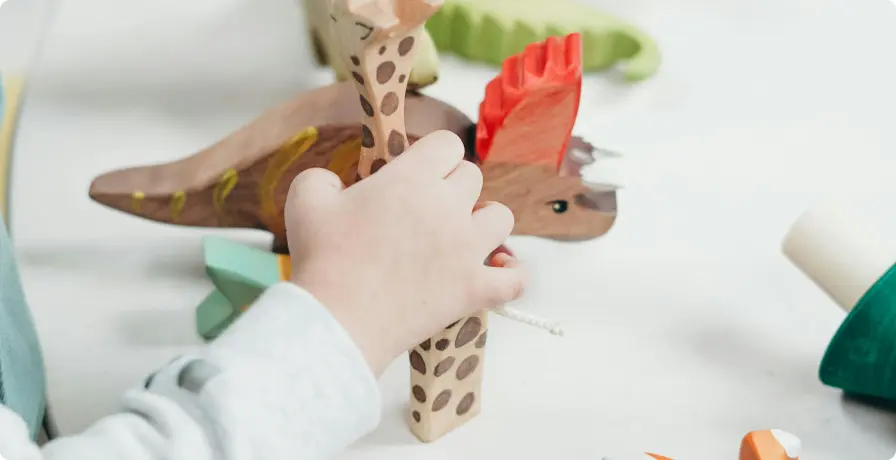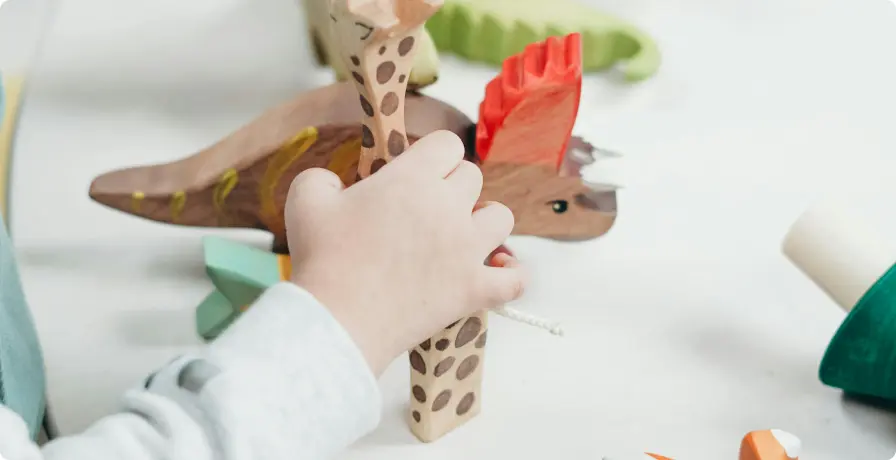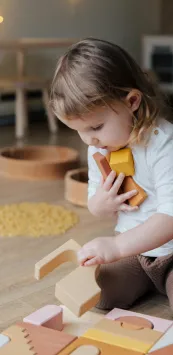Assisting Children Through Paediatric Speech Pathology

At South West Kids Clinic, we specialise in providing compassionate and personalised speech therapy services for children in Liverpool.
Conveniently located just off Hoxton Park Road, our qualified and experienced speech therapists and pathologists work closely with families to develop tailored treatment plans, helping children overcome speech and language challenges.
Our goal is to empower children to communicate effectively, enhancing their confidence and independence.
Located in a child-friendly environment, we focus on making therapy sessions engaging and comfortable, ensuring the best possible outcomes for each child.
Reach out today on (02) 9602 3377 or via our online contact form to learn how we can be the bridge to your child’s brighter, more confident future.
Ways Our Paediatric Speech Pathologists Support The Children In Liverpool, NSW

We offer a range of specialised services designed to address speech, language, and feeding difficulties. By understanding your child’s unique needs and working closely with your family, we create tailored therapy plans that focus on achieving meaningful progress. Whether your child needs help with speech clarity, language development, or feeding skills, our goal is to support their growth and confidence every step of the way.
Accelerate Understanding and Use of Language
We focus on accelerating your child’s understanding and use of language. Our speech therapists work with children to enhance their ability to comprehend and express themselves through targeted strategies and activities. We tailor our approach to each child’s unique needs, promoting vocabulary growth, sentence formation, and effective communication. Our goal is to help your child develop strong language skills that boost their confidence and independence in daily interactions.
Augmentative and Alternative Communication (AAC)
We offer Augmentative and Alternative Communication (AAC) services to support children who face significant challenges with verbal communication. Our therapists specialise in assessing and implementing AAC solutions tailored to each child’s needs, such as communication boards, apps, or speech-generating devices. We guide families through the selection and integration process, ensuring these tools are effectively used at home and school, enabling children to express their needs, thoughts, and emotions confidently.
Speech Sound Development
Our speech sound development services focus on helping children articulate sounds clearly and correctly. We assess each child’s speech patterns to identify specific sound errors or delays. Using evidence-based techniques, our therapists guide children through exercises that target these challenges, improving their ability to produce sounds and speak clearly. By addressing speech sound issues early, we aim to enhance your child’s overall communication skills, fostering better social interactions and academic performance.
Tailored Therapy with Individualised Goals
Our therapists collaborate closely with families as well as your child’s therapy team, educators, and medical professionals to set specific, measurable goals tailored to each child’s unique needs. Whether targeting speech clarity, language comprehension, or social communication, these goals guide our therapy sessions, ensuring that each child receives focused support. This personalised approach helps children achieve meaningful progress, building the skills they need to thrive in everyday life.
Stuttering and Fluency Intervention
Stuttering and fluency difficulties can deeply affect a child’s communication and self-esteem. Our approach focuses on helping children achieve smoother, more fluent speech through personalised strategies and exercises that reduce stuttering. Collaboration with families and educators is key, as it ensures that techniques are reinforced in everyday situations. This comprehensive support system helps children build confidence in their communication abilities, leading to improved interactions at home, school, and in social settings.
Dysphagia Intervention
Dysphagia, which involves difficulty swallowing, can have serious implications for a child’s health and quality of life. Our dysphagia intervention addresses these challenges with tailored therapy plans that focus on improving safe swallowing and overall oral function. These plans are customised to address the specific challenges each child faces, ensuring they can eat and drink with greater ease and comfort. The goal is to enhance the child’s ability to eat and drink safely, thereby improving their overall well-being and participation in daily activities.
Advanced Speech Pathology Treatments We Implement

Our team of experienced therapists utilises a variety of specialised techniques designed to address a wide range of speech and language challenges. By combining evidence-based practices with a deep commitment to personalised care, we aim to support each child’s communication journey, helping them achieve meaningful progress in a nurturing and supportive environment. Here are the speech pathology methods we implement:
HANEN
The HANEN approach is designed to empower parents and caregivers to support their child’s language development through everyday interactions. By focusing on natural, everyday activities, this technique encourages children to communicate and engage in meaningful conversations. The approach is particularly effective for young children and those with early language delays. It helps create a language-rich environment at home, where parents become active participants in their child’s speech and language growth, reinforcing the progress made during therapy sessions.
Learn To Play/Play-based Therapy
Learn To Play/Play-based Therapy is a child-centred approach that uses play as a primary medium for encouraging communication and language development. This technique allows children to explore, create, and interact in a way that feels natural and enjoyable. Through structured play activities, children develop critical language, social, and cognitive skills. Our therapists guides these play sessions to target specific speech and language goals, making learning both fun and effective, while also promoting the child’s overall development.
Augmentative and Alternative Communication (AAC)
Augmentative and Alternative Communication (AAC) provides essential support for children who struggle with verbal communication. This technique includes tools like communication boards, speech-generating devices, and picture systems to help children express themselves. AAC is tailored to each child’s abilities, ensuring they can communicate effectively in a way that suits their needs. The goal is to enhance the child’s ability to interact with others, fostering greater independence and participation in daily activities.
Switch Access Methods
For children who face physical challenges in using traditional communication tools, Switch Access Methods offer an adaptable solution. This technique involves customising switches to respond to a child’s specific motor abilities, enabling them to control devices with simple actions like pressing a button or activating a switch with a particular movement. By providing access to communication through these methods, children gain the ability to interact more independently, ensuring they can participate in conversations and express themselves effectively.
DTTC - Dynamic Temporal and Tactile Cueing
Dynamic Temporal and Tactile Cueing (DTTC) is a specialised method for treating severe speech motor disorders, such as apraxia of speech. This approach involves intensive, hands-on practice where the therapist provides cues that gradually fade as the child’s speech improves. The focus is on refining the timing and coordination of speech movements to produce clearer, more accurate speech. DTTC is highly adaptive, with the therapist modifying cues and practice intensity based on the child’s progress.
ReST - Rapid Syllable Transition Treatment
Rapid Syllable Transition Treatment (ReST) is a targeted approach for children with childhood apraxia of speech. This method focuses on practising rapid transitions between sounds, syllables, and words to improve speech fluency and accuracy. Through structured and repetitive practice, children learn to produce more natural-sounding speech with correct prosody. Unlike other techniques, ReST emphasises real words and phrases, helping children apply their skills in everyday communication, thus enhancing their ability to be understood by others.
Phonological Awareness
Phonological Awareness is essential for developing strong reading and spelling skills. This technique involves teaching children to recognise and manipulate sounds in words, such as rhyming, segmenting, and blending. By focusing on the sound structure of language, children gain a deeper understanding of how words are formed, which is critical for literacy development. Activities are tailored to the child’s age and skill level, ensuring that they build a solid foundation for reading and writing success.
PROMPT
PROMPT (Prompts for Restructuring Oral Muscular Phonetic Targets) is an advanced technique used to improve speech clarity and coordination in children. Our therapists use tactile cues on your child’s face to guide them in producing specific sounds. By physically shaping the movements required for speech, children can develop more accurate articulation and muscle memory. PROMPT is particularly effective for children with motor speech disorders, as it provides immediate, hands-on feedback that helps them achieve clearer, more precise speech.
Lidcombe Program
The Lidcombe Program is a behavioural treatment designed specifically for young children who stutter. This evidence-based approach involves parents in the therapy process, where they deliver positive reinforcement for fluent speech during everyday conversations. The program is structured around naturalistic speech practice, with our therapist guiding parents on how to effectively implement these techniques at home. This early intervention strategy is highly effective in reducing stuttering, fostering more fluent and confident communication in children.
Fluency Intervention
Fluency intervention focuses on helping children develop smoother, more natural speech patterns, particularly those who struggle with stuttering. The approach involves a combination of strategies tailored to each child’s unique needs, such as breathing techniques, speech pacing, and gentle corrections. By practising these techniques, children learn to speak with greater ease and confidence. The goal is to reduce instances of stuttering and empower the child to communicate effectively in various social and academic settings.
Responsive Feeding Practices (RFP)
Responsive Feeding Practices (RFP) are designed to create a positive, stress-free mealtime environment for children who have feeding difficulties. This approach encourages parents to be attuned to their child’s hunger and fullness cues, promoting a more intuitive and enjoyable eating experience. The focus is on building trust between the child and caregiver, helping the child feel safe and supported during meals. By fostering a responsive and relaxed approach to feeding, children are more likely to develop healthy eating habits and overcome feeding challenges.
Developmental Food Continuum
The Developmental Food Continuum is a method used to support children in progressing through different stages of eating, from purees to more complex textures and solid foods. This approach is tailored to each child’s developmental stage and oral motor abilities, ensuring that they are introduced to new food textures at a pace that matches their individual needs. The aim is to promote safe and effective eating habits, helping children build the skills necessary for a varied and balanced diet.
STEPS+ Program
The STEPS+ Program is an evidence-based approach designed to support children with feeding and swallowing difficulties. This program focuses on gradual, step-by-step progressions in feeding skills, addressing both physical and behavioural aspects of eating. The technique involves a multidisciplinary approach, combining input from therapists, dietitians, and caregivers to create a comprehensive plan that encourages positive feeding experiences. The ultimate goal is to help children achieve safe, enjoyable, and nutritionally adequate eating habits, improving their overall health and well-being.
Pacing Methods
Pacing methods are used to help children manage their rate of speech, especially those who speak too quickly or have difficulty with fluency. These techniques involve teaching the child to regulate their speech by pausing between words or phrases, which helps them articulate more clearly and reduces the likelihood of stuttering. Pacing methods are often combined with visual or tactile cues to reinforce the desired speech rhythm, leading to more controlled and effective communication.
Division of Responsibility Method
The Division of Responsibility Method is a feeding approach that clearly defines roles for both the parent and the child during mealtimes. Parents are responsible for deciding what, when, and where food is offered, while the child is in control of how much to eat and whether to eat at all. This method reduces mealtime struggles by empowering the child to listen to their body’s cues, promoting a healthy relationship with food and encouraging self-regulation in eating habits.
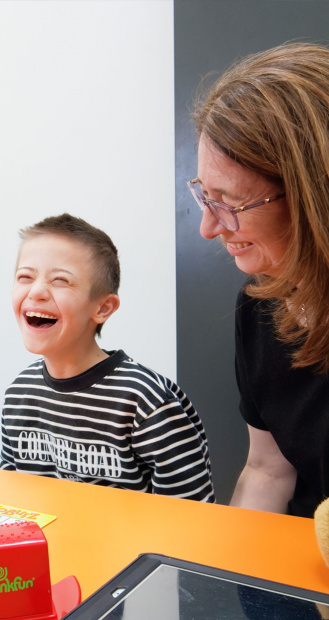
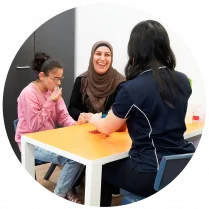
Our Liverpool Clinic – Accessible and Purpose-Built for Your Child's Care
Located just five minutes from Liverpool, our speech therapy space offers easy access without the stress of navigating the busy city centre.
With ample onsite parking, including dedicated disability parking right at our doorstep, we ensure a smooth and convenient experience for you and your child.
Our clinic also features accessible amenities designed to accommodate children and carers using mobility aids, ensuring comfort and ease during your visit.
A Space Designed for Comprehensive Care
Our purpose-built Liverpool clinic spans over 1000 sqm and has been designed to provide the highest level of care for children with a variety of needs. Key features include:
- 23 Individual Treatment Rooms Designed for different types of therapy to suit your child’s needs.
- Indoor Rehab Gym – Equipped with the latest therapy equipment like spider cages, treadmills, climbing structures, and a mobility track to support all levels of physical therapy.
- Therapy Kitchen – Our kitchen, designed with lower bench heights, allows children using wheelchairs to fully participate in therapy sessions.
- Advanced AAC Equipment: Access to complex assistive communication devices, including eye gaze technology and switch-adapted toys.
- Accessible and Modern Facilities – From bathroom amenities to our child-friendly atmosphere, we ensure a clean, comfortable, and welcoming environment.
This purpose-built space prioritises accessibility, innovation, and comfort to ensure therapy is effective and enjoyable for every child and their family.
When is the best time to start therapy?
The best time to start therapy is when you notice any developmental delays or concerns in your child. Early intervention is crucial as it can significantly improve the effectiveness of the treatment, helping your child achieve the best possible outcomes.
How often will I come to therapy?
The frequency of therapy sessions typically depends on your child’s specific needs and goals during the initial assessment. Most children benefit from weekly sessions, but we may suggest more or fewer visits based on your child’s progress.
Why is it important to be active in my child's therapy?
Put simply, the greater your involvement is in therapy, the quicker your child will gain results. For this reason, we only work with families actively involved in their child’s therapy. This includes collaborating to establish goals, participating in therapy sessions, completing practice between sessions and providing feedback to your therapist about progress between sessions.
Will you help me know what therapy I need?
Our team conducts comprehensive assessments to understand each child’s strengths and challenges. Based on these assessments, we develop individualised therapy plans that are continually adapted to reflect progress and changing needs.
How do I book an appointment?
You can contact our clinic directly or via email to discuss your child’s needs. Our reception team will ask quick questions about your child to determine the next steps required.
Will you help my child at school or child care?
Therapy sessions are primarily completed in our clinic; however, we occasionally recommend contacting the school or child care to observe your child and consult with the teachers regarding valuable strategies to promote success in the classroom or playground. Occasionally, ongoing sessions are suggested; however, this is based on clinical need rather than convenience.
South West Kids Clinic offers personalised support and guidance to children with movement-based conditions in Liverpool. Our experienced and caring team is committed to positively impacting your child’s life.
South West Kids Clinic delivers customised therapy and treatments to children with movement-based conditions. Our services are readily available and personalised to meet the needs of families in the Bankstown area, ensuring that every child receives the care they require.
At South West Kids Clinic, we’re proud to support families from Campbelltown and surrounding suburbs with therapy services designed to help children reach their full potential.
Our Prestons clinic is only about 15 minutes from Campbelltown, making it easy for families to access high-quality paediatric care close to home. Whether your child needs help building strength, improving communication, or developing daily living skills, our multidisciplinary team is here to help every step of the way.
At South West Kids Clinic, our approach is to offer customised therapy and treatments for children with movement disorders. We ensure our services are accessible and tailored specifically for families living in the Fairfield area, ensuring every child receives the necessary care.
At South West Kids Clinic, we deliver individualised therapy and treatments for children with movement challenges. Our services are adapted to fit the unique requirements of families in the Preston area, ensuring all children receive the dedicated care they need.
South West Kids Clinic offers personalised support and guidance to children with movement-based conditions at our clinic in Picton. Our experienced and caring team is committed to positively impacting your child’s life.

